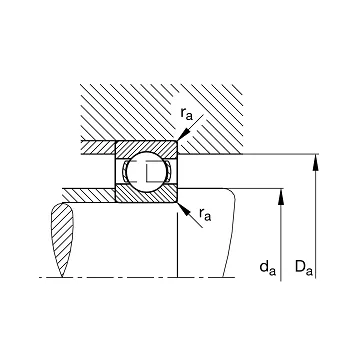Oct . 17, 2024 02:41 Back to list
custom deep groove ball bearing material
Custom Deep Groove Ball Bearing Material Selection and Significance
Deep groove ball bearings are widely recognized for their versatility and ability to accommodate both radial and axial loads. They are a fundamental component in various mechanical applications, from household appliances to complex industrial machinery. One critical aspect of their design is the material used in manufacturing these bearings, which significantly affects performance, durability, and overall efficiency.
Understanding Deep Groove Ball Bearings
Deep groove ball bearings consist of an inner ring, an outer ring, balls, and a cage. The deep groove design allows for high radial load capacities and moderate axial loads in both directions. Their simplicity and effectiveness make them a popular choice in numerous applications, including electric motors, automotive components, and agricultural machinery.
The Importance of Material Selection
Selecting the right material for deep groove ball bearings is essential for operational efficiency and longevity. The material not only impacts the bearing's load-carrying capacity but also its resistance to wear, corrosion, and temperature extremes. The most commonly used materials include
1. Stainless Steel Stainless steel is popular for its excellent corrosion resistance and mechanical properties. It is widely used in applications exposed to moisture or aggressive environments. The grade of stainless steel, such as AISI 440C, can provide higher hardness and wear resistance, making it suitable for high-performance applications.
2. Chrome Steel Chrome steel (AISI 52100) is the most widely used material for high-load applications. It boasts high hardness, exceptional wear resistance, and the ability to sustain higher temperatures compared to other materials. Chrome steel bearings are ideal for applications that demand precision and durability.
3. Ceramic Materials For specialized applications, ceramic materials—especially silicon nitride—are gaining popularity. Ceramic bearings offer low friction, high speed, and excellent resistance to corrosion and wear. They are particularly effective in high-speed applications and extreme environments, including cryogenics and vacuum conditions.
4. Polymer Materials In some applications, particularly where weight reduction is critical, polymer bearings made of materials such as PEEK or nylon may be utilized. While they may not hold up to the extreme loads that steel or ceramics can, they can be effective in non-load bearing applications and environments where moisture and chemical resistance are vital.
custom deep groove ball bearing material

5. Hybrid Bearings Hybrid bearings combine ceramic balls with steel rings, offering a compromise between the benefits of both materials. They provide reduced weight and lower friction while maintaining a high level of load-bearing capacity.
Factors Influencing Material Choice
When selecting the material for deep groove ball bearings, several factors must be considered
- Operating Environment The bearing's exposure to moisture, chemicals, dirt, and temperature extremes will influence the material choice. For harsher environments, corrosion-resistant materials like stainless steel or ceramic may be preferable.
- Load Requirements The type and magnitude of loads that the bearing will encounter directly impact the material selection. For high-load scenarios, chrome steel is often the best choice.
- Speed of Operation Bearings in applications requiring high rotational speeds may benefit from ceramic materials or hybrid designs that minimize friction and heat generation.
- Cost Considerations While advanced materials like ceramics may offer superior performance, budget constraints often dictate the material choice, necessitating a balance between cost and functionality.
Conclusion
The material used in custom deep groove ball bearing manufacturing plays a pivotal role in optimizing their performance and extending their lifespan. By carefully considering the application requirements and environmental factors, engineers can select the most suitable material, ensuring that the bearings function effectively and reliably. As technology advances, the exploration of new materials and designs will continue to enhance the capabilities of deep groove ball bearings, making them an indispensable fixture in modern machinery.
Latest news
-
UCFC212-38 Round Flange Housing 4 Bolt Ball Bearing - Durable & Precision
NewsAug.29,2025
-
GW315PPB11 Ball Round Hole Agricultural Bearings - Durable & Reliable.
NewsAug.28,2025
-
Top Spherical Roller Bearing Material Exporter - High-Performance Alloys
NewsAug.27,2025
-
Durable PLC 110-190 Spherical Roller Bearing for Mixer Reducer
NewsAug.26,2025
-
CSK-2RS Sprag Clutch One Way Bearing: Sealed, High Torque, Durable
NewsAug.25,2025
-
CKZ-D Series One Way Overrunning Clutch: Reliable Power Control
NewsAug.24,2025